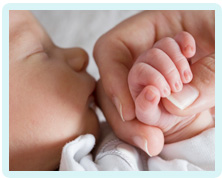
Junior Doctor Fails To Diagnose Third Degree Tear
After developing faecal incontinence, Nina was told she had sustained a third degree tear during the birth of her second child. This had not been diagnosed by the junior doctor after the delivery, causing serious complications.
When Nina gave birth to her second child, it was a long labour complicated by shoulder dystocia. A ventouse extraction was needed, and after two pulls a healthy baby boy was delivered.
After the delivery, a junior doctor briefly examined Nina and diagnosed a second degree tear. However, she did not perform a thorough examination with a digital rectal examination, meaning she did not realise that Nina actually had a third degree tear. The perineum was stitched by the doctor, who required continual assistance from the midwives.
Nina remained very weak for the following two days, and her recovery was further hindered by a perineal haematoma. Three days after being discharged from hospital, she suffered an episode of faecal leakage and returned to hospital. She was told she had no rectal squeeze and was referred for physiotherapy.
The physiotherapist was clearly shocked that Nina had managed to give birth to such a big baby. However, at no point during the course of the pregnancy had she been offered a C-section. The physiotherapist suggested pelvic floor muscles would improve Nina's symptoms, which by now included urinary incontinence whenever she laughed, coughed or sneezed.
At her six week check-up, Nina described her problems to the GP, saying it felt like everything down below had collapsed into one. She said it felt as though she no longer had a front or back passage and was even passing wind through her vagina. Despite this, the GP said her symptoms were perfectly normal and would improve with time.
Unfortunately this did not turn out to be true. Nina was still suffering faecal incontinence seven months after the birth. She had not control over the passing of faeces or wind, and she was also still passing wind through her vagina. She returned once again to the GP, and this time she was referred to a gynaecologist.
After examining Nina, the gynaecologist suspected a missed third degree tear, noting that part of her anal sphincter was absent. This was later confirmed by a colorectal surgeon who carried out an MRI scan. This showed significant damage to Nina's external anal sphincter, something which should have been diagnosed and repaired by the doctor shortly after the delivery.
Nina has since undergone sacral nerve stimulation which has helped to improve her symptoms slightly. Nevertheless, she continues to have poor control over the passing of faeces and wind, and it is unlikely this will ever fully resolve. Consequently Nina has become reluctant to leave the house in case she suffers an accident.
These life-changing complications could have been avoided had the doctor performed an adequate examination after the birth. This would have led to a third degree tear being detected and repaired. A failure to do so amounted to a substandard level of medical care, for which we helped Nina claim compensation. She was awarded in excess of £70,000 in compensation.
(Details which might identify our client have been changed.)
Would You Like Assistance from Specialist Birth Injury Claims Solicitors?
If you would like to benefit from a service of excellence with total commitment to client care from a small and friendly team, Glynns are ready and waiting to help you.
Please call us on 0800 234 3300 (or from a mobile 01275 334030) or complete our Online Enquiry Form.



